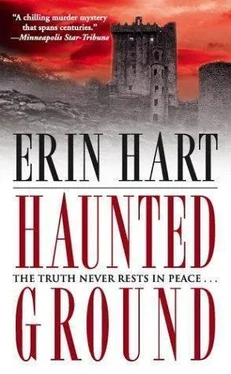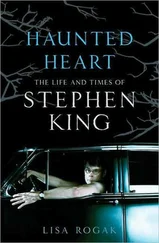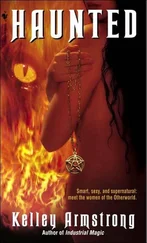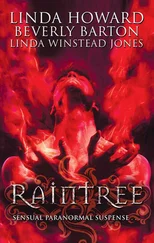“Hold up there,” Cormac said gently. “No need to run.” Jeremy was wresting his arms away from Cormac as Nora came up behind him. “Hello, Jeremy,” she said, and he turned to look at her again. Out here in the daylight, how fragile he looked, she thought, with the same large eyes, pronounced cheekbones, and pale, translucent skin his mother had. His features were more pleasing, however, and his cheeks still had the youthful high color Lucy’s had lost. Something in the way he moved reminded Nora of a skittish horse, and from what she’d seen of this boy with his mother, he was not unused to bit and bridle.
“What are you up to?” she asked, hoping that the glimmer of friendship she’d once seen in his eyes could be coaxed back if they used gentle words, and avoided sudden movement.
“I wasn’t spying,” he said. “I came to help.” Nora looked at Cormac and raised her eyebrows in silent exclamation.
“That’s great,” she said. “I’m sure we can find plenty for you to do. Nice of your mother to spare you.”
Jeremy’s eyes met hers for an instant. “I’m here on my own.”
“Well, we can certainly make use of you,” Cormac said. “Always good to have an extra pair of hands. You don’t mind being a general dogsbody, do you? I’m afraid that’s the only position available on this dig.”
“I don’t mind.”
“Can I show you what to do?” Cormac led the boy over to the trench, while Nora went to the jeep to get their lunch pack; she really was ravenous. When she came back, she watched them for a while: Cormac, his voice quiet and confident, was explaining what they were about, what Jeremy should look for, and how he was making a record of everything they found. This was a side of him she hadn’t seen: Cormac the teacher, down on one knee, demonstrating the proper way to sift debris, letting the boy try it, then praising him for a quick study. Jeremy was hunkered down on his heels like a child, filling the pan, sifting through it with his fingers, and methodically dumping the gravel into the small pile she had started.
“Well, now you’re fully broken in,” she said to Jeremy, “how about some lunch? We’ve plenty of food.” She could see the boy hesitate slightly before accepting. They settled on a patch of grass a short distance from the trenches and Nora began passing the sandwiches, then poured them each tea from a flask. Cormac took out his pocketknife to cut a pair of green apples so the three of them might share. The sky was overcast, but behind the clouds they could tell the sun had climbed to its place at the top of the sky; the day was growing more close by the minute. They’d been saved from sweltering thus far by a gentle but steady wind that seemed to roll down from the mountains in the west.
“Ever work on a dig before?” Cormac asked. Jeremy shook his head, and Nora was struck by the mannerly way the boy swallowed his food before answering.
“I used to come and watch, when they were working on the priory,” he said, “but they’d usually run me off. Didn’t want me messing about, I suppose. I was only a kid.”
“You must be finished with secondary school,” Cormac said. Jeremy nodded. “Are you thinking about going on to university?” Though it was asked without judgment, this question seemed to make the boy uncomfortable. He started methodically uprooting handfuls of the grass that grew beside him.
“I’ve still got exams. I’m not sure yet what I want to do. Mum says I ought to be learning something about how to run an estate,” Jeremy said, his voice betraying how little he thought of such an occupation.
“What are you interested in, Jeremy?” Nora asked. His eyes met hers, and for a second she thought she saw something in them vaguely akin to an accusation. Then they dropped to the ground again, to the rapidly balding patch beside him.
“I—I don’t know,” he stammered. As though that were something to be ashamed of, Nora thought, at his age. She could see his ears begin to burn a bright crimson.
After lunch, they continued working a good three and a half hours until teatime. Cormac took a break from his spadework to take some photographs showing the general progress of the dig and to check levels. Jeremy acted as his assistant, holding the meter staff in place to mark the depth of the trenches, and the scale of variances in coloration. As the afternoon wore on, the breeze died down, until there was hardly a breath stirring. Nora stopped to take a long drink from her jug, then tipped her head down and poured some of the lukewarm water over the back of her neck. As she stood straight again and mopped the extra droplets with her bandanna, she found Jeremy Osborne staring at her. When their eyes met this time, he did not look away, and something in his look made her inordinately self-conscious. Nora turned away and knelt to gather up her tools. She remembered helping the sodden young man to his feet the night they met, and wondered whether he might have acquired an unhealthy yen for her. If that was the case, she’d probably only encouraged it, chatting away like that the afternoon she found him asleep in the nursery. How could she get him to talk to her now? She had had no business fueling any adolescent fantasies. Nora suddenly remembered the breathy voice on the telephone. Could the words of warning have come from Jeremy Osborne?
Nora had been surprised when Una McGann and her daughter stopped by the dig on Friday to ask for a lift into town on Saturday morning for the market, but she’d agreed, partly out of curiosity. The market was just gearing up this time of year, Una said, but there were small baskets of new potatoes, early hothouse strawberries, flowers, peas, lettuces, white and brown hen eggs, duck eggs. No one made cheese anymore, but there were homemade sausages and black and white puddings, along with household goods like rush brooms and baskets.
Saturday morning arrived damp but mild. Nine o’clock seemed late for a market to open, Nora thought, as she approached the McGanns’ house. She hoped she wasn’t late. Through the open window, she could see the little girl, Aoife, skipping in a circle around the kitchen table and hear Una counting aloud, no doubt totting up how much her wares would bring. The little girl’s voice broke in: “Mammy, Mammy, can I get a bun from the sweet shop, can I please, Mammy?”
Una’s reply was short: “I’m still counting, Aoife, can’t you hush?”
“Mammy, Mammy.” Aoife was pulling on her mother’s hand now. “I think she’s here. I think she’s here.” Una withdrew her hand in annoyance, and Aoife, who had been pulling with all her strength, went sprawling backward. There was a moment of horrified silence before the child began to whimper, and Una dropped to the floor beside her.
“I’m sorry, I’m sorry. I’m just so tired, Aoife. I’m not angry with you.” When Nora came to the open door, Una was kissing her daughter’s head, and rocking back and forth to calm them both.
“Hello,” Nora called. “Anyone home?” Una was helping Aoife to her feet, and wiping her eyes with the back of one hand.
“Are you all right?” Nora asked. Una looked frayed, but she patted her daughter’s hand and said, “We’re grand now, aren’t we, a chroi? Nora, could you manage a few of these bags? Aoife, you take a couple as well.” Una herself picked up the heavy box full of sweet cakes, and followed them out the door.
When they arrived in Dunbeg, the market vendors were still setting up: Travelers setting out cheap mobile phones and garish rugs next to farmers selling brown eggs and wild heather honey. Una shared a stall with a few fellow artists, some of whom had finished work to sell, and some, like herself, who sold whatever they could. Aoife hung on her mother’s conversations with fellow vendors though it was clear, from the number of times she had to be asked to stop touching the goods and to be careful not to knock things over, that she was getting underfoot.
Читать дальше











